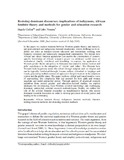Resisting dominant discourses: implications of indigenous, African feminist theory and methods for gender and education research

View/
Date
2010-11Author
Chilisa, B.
Ntseane, G.
Publisher
GE, http://www.tandfonline.com/loi/cgee20Type
Published ArticleMetadata
Show full item recordAbstract
In this paper we explore tensions between Western gender theory and research, and post‐colonial and indigenous feminist standpoints, which challenge us to re-define our roles as feminist-activist educators and researchers working with formerly colonised and historically marginalised communities. We discuss how African and Black feminist approaches can enable the construction of context-specific knowledge of African women’s power via relational world views of motherhood, family, sisterhood and friendship. In contrast, the application of Western gender theory and policy in Botswana has tended to reduce women and girls’ experiences to the categories of ‘victim’ and ‘other’. We illustrate how Western male hegemony enters the school through subjects such as religion and can be typically reinforced through Tswana culture, embodied in language and rituals, generating multiple centres of oppression for girls/women in the education system and the public space. The paper explores ethical and transformative ways of approaching this complexity that can account for how girls and women negotiate and resist patriarchal power. Through analysis of empirical research narratives from several gender‐ and education-focused studies, we explore strategies for decolonising Euro-Western archival knowledge and challenging dominant, patriarchal, colonial research methodologies. Finally, we outline the role of the activist feminist researcher as transformative healer, who resists dominant research discourses in order to develop processes of social justice and healing in the community.
